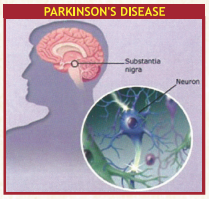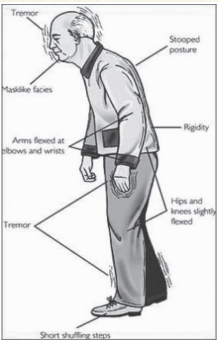Yogic Management of Parkinson's Disease
Yogic Management of Parkinson's Disease
- Parkinson's Disease
- Pathophysiology
- Causes
- Signs and symptoms of Parkinson's Disease
- Symptoms that affect Motor function (physical movement)
- Neuropsychiatric symptoms affecting (mood, thinking and behavior).
- Symptoms that affect autonomic nervous system (Breathing, Urination).
- Management
- Self Help or Prevention of Parkinson disease
- Yogic Practices for the Management of Parkinson's Disease
Parkinson's Disease
Parkinson's disease is a degenerative disorder of the brain. Descriptions about Parkinson's disease is present in ancient Indian system of medicine; Ayurveda. It is described as the disorder Kampavata. Parkinson's disease belongs to a group of conditions called movement disorders. In this disorder, nerve cells or neurons in brain that control muscle movements are greatly affected. It is characterized by progressive loss of muscle control, which leads to trembling of the limbs and head while at rest, stiffness, slowness, and impaired balance. This disease generally develops in elderly people after the age of 50. Sometimes Parkinson's disease occurs in younger adults. It affects both men and women. The progression of Parkinson's disease and the degree of impairment vary from individual to individual. Many people with Parkinson's disease may live long productive lives, whereas others become disabled much more quickly.
Pathophysiology
 Parkinson's disease is a degenerative disorder of the central nervous system whose exact causes are unknown. Most of the movement- related symptoms of Parkinson's disease result from the lack of or death of dopamine generating nerve cells in the substantia nigra. Dopamine normally sends signals. that help coordinate muscle movements. When the amount of dopamine is too low, communication between the substantia nigra and corpus striatum becomes ineffective, and movement becomes impaired; the greater the loss of dopamine, worse the movement-related symptoms.
Parkinson's disease is a degenerative disorder of the central nervous system whose exact causes are unknown. Most of the movement- related symptoms of Parkinson's disease result from the lack of or death of dopamine generating nerve cells in the substantia nigra. Dopamine normally sends signals. that help coordinate muscle movements. When the amount of dopamine is too low, communication between the substantia nigra and corpus striatum becomes ineffective, and movement becomes impaired; the greater the loss of dopamine, worse the movement-related symptoms.
Other cells in the brain also degenerate to some extent and may contribute to affects other non-movement related symptoms of Parkinson's disease.
Causes
There are several possible causes for Parkinson's diseases are :
- Genetic
- Excessive Stress
- Environmental factors : Possible toxins could include : pesticides and herbicides used in farming, toxins released by industrial plants, air pollution related to road traffic
- Excessive alcohol consumption
- Any other kind of neurological illness
- Drug abuse
Signs and symptoms of Parkinson's Disease
The symptoms of Parkinson's disease usually begin slowly and develop gradually, not in any particular order. Parkinson's disease affects people in many different ways with a variety of symptoms and responses to treatment. Severity of the symptoms also varies between people. Potential symptoms can vary widely but are within three broad categories :
Symptoms that affect Motor function (physical movement)
- Tremors : It is one of the most common symptoms. Trembling in fingers, hands, arms, feet, legs, jaw or head. Resting tremors is noticeable when hands are at complete rest.
- Rigidity : This includes stiffness of the joints and when combined with tremor will produce cogwheel tuype of rigidity when the limbs are passively moved.
- Akinesia or Bradykinesia : This slowness or absence of movement.
- Postural Instability
- Shuffling gait : While walking person takes small steps with their feet barely leaving the ground.
- Stopped posture : In severe or progressive forms of Parkinson's disease, the persons head and upper body may become bent at right angle to trunk.
- Dysphagia : The person may have difficulty in swallowing and this lead to aspiration some times.
Neuropsychiatric symptoms affecting (mood, thinking and behavior).
- Depression : Depression is thought to affect between 30-80 percent of all people suffering from Parkinson's disease.
- Mild cognitive impairment : The person's voluntary and involuntary responses will show a significant delayed reaction.
- Dementia : Dementia will often occur in about 20-40 percent of all people suffering from Parkinson's disease.
- Anxiety : Anxiety can also affect people with Parkinson's disease especially when there is sudden return of their motor symptoms.
- Sleep disturbances : Insomnia (problems sleeping) is thought to affect around half of those with Parkinson's disease. Causes of insomnia are often complex. They can include changes to the brain, side-effects of some of the medications used to treat Parkinson's disease, breathing difficulties during sleep.
Symptoms that affect autonomic nervous system (Breathing, Urination).
- Problems with urination : Such as getting up frequently during the night to urinate and, or separately from, urinary incontinence (the unintentional passing of urine).
- Drooling : The person may have drooling of saliva, this is due to inability to swallow.
- Erectile Dysfunction in Men : Inability to obtain or sustain an erection
- Constipation
Management
Parkinson's disease is a chronic disorder that requires broad based management including patient and family education, support group services, general wellness maintenance, physiotherapy, exercise and nutrition. At present, there is no cure for Parkinson's disease, but medications or surgery can provide relief from the symptoms. Deep brain stimulation is presently the most used surgical means of treatment.
Complementary Treatments

There are many modalities and nutritional supplements which can ease symptoms and improve quality of life. It is vital that patients inform their physician about the over the counter medications, herbs or other supplements that they use on a normal basis because they may interact with the medication and because drug dosages may require to be adjusted. Exercise therapy can help support and tone the underused muscles and give inflexible joints a better range of motion. The main purpose of medical practitioner is to facilitate build body strength, improve balance, overcome gait problems and improve speaking and swallowing.
Yogic Management
Yoga plays a great role in developing a sense of well being in the person and produces a harmony between physical and mental levels. It activates or stimulates nerve cells for better functioning when regularly practiced with positive attitude it also reduces the hyperactivity of the all systems of the body. Yoga practice develops physical and psychological stamina thus helps in improving the concentration and removes fear from the mind of the individual.
The practices which are helpful in the management of Parkinson's disease are:
- Kriyas : Jalneti, Sutra neti, Kapalbhati
- Yogic Sukshma Vyayama : Buddhitatha Dhritishaktivikasaka, Medhashaktivikasaka. Manibandha Shakti VikasakaKryia, Kartala Shakti vikasakakryia.
- Yogic Sthula Vyayama : Urdhwagati, Rekhagati
- Yogasana : Tadasana, Trikonasana, Hastottanmasana, Pavanamuktasana, Vajrasana, Vakrasana, SaralMatsyasana, Shalbhasana, Paschimottanasana, Ushtrasana, Bhujangasana, Katichakrasana, Shavasana, Makarasana.
- Pranayama : Nadishodhan, Bhramari, Ujjayi and Sitali.
- Meditation : Breath awareness, Om Meditation or guided meditation focusing on the affected part.
- Special practice : Yoga nidra and Surya Namaskara (depending upon person's condition)
- Yogic diet (Mitahara) : Alkaline foods with less oil, salt and spice
- Note : The inverted postures and the hyperventilation practices (forceful breathing) are to be avoided.
Self Help or Prevention of Parkinson disease
- Try to accept and know more and more about the disease condition, worrying about all the things do not make life predictable. Practice of relaxation techniques like meditation, deep breathing etc when followed regularly can produce somoothening effects.
- Develop healthy eating habits, avoid excess of oily, spicy and junk food stuffs.
- Reduce alcohol and smoking habits and better increase the intake of water quantity per day.
- Daily exercise or regular walk is very helpful.
- Good sleep is very important to relax whole body and nerves.
Yogic Practices for the Management of Parkinson's Disease
.png)
Last Modified : 8/31/2023
This topic provides information about Yogic Manage...
This topic provides information about Yogic Manage...
Provides information about Do’s and Don’ts of Yoga...
This topic provides information about Yogic Manage...
